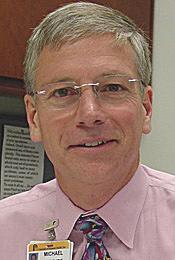Medical professor Michael LeFevre has been named to the Institute of Medicine, one of the highest honors in the medical field.
The Institute of Medicine, based in Washington, D.C., is an independent organization that advises the nation in improving health. The institution announced the names of 65 new members Oct. 17.
“It is a great pleasure to welcome the distinguished and accomplished individuals to the Institute of Medicine,” Institute of Medicine President Harvey V. Fineberg said in a news release. “Each of them stands out as a professional whose research knowledge and skills have significantly advanced health and medicine, and their achievements are an inspiration.”
As co-vice chairman of the United States Preventative Services, LeFevre is behind a controversial new stance against certain cancer screenings. Earlier this month, the task force published a draft recommending against prostate-specific antigen-based screenings for prostate cancer.
The tests screen for PSA, a protein produced by prostate cells. Higher levels could indicate the presence of prostate cancer. The problem, according to the task force, is that the cancer might not need detecting.
“The reality is that prostate cancer is enormously common,” LeFevre said. “It’s a cancer that if you live long enough you have a very high likelihood of developing, but you are more likely to die with it than you are to die from it.”
He said treating the cancer can end up doing more harm than good. A very small percentage of prostate cancers actually cause damage.
Jack Colwill, former chairman emeritus of MU Family and Community Medicine and Institute of Medicine member, said he believes LeFevre’s involvement in these types of studies led to him being named to the institute.
“He is working in one of the real cutting edge areas of medicine today,” Colwill said. “Much of medicine in the past has not been evidence based. What we’re doing now is increasingly trying to make decisions based upon high-quality evidence.”
The Institute of Medicine chooses new members in a highly selective process. The annual cycle begins Nov. 1 and nominations are accepted until Feb. 1. Each nomination must come from a member. Elections are then held late in the summer, with the new members announced in early October.
A new member must have made major contributions to the advancement of the medical sciences, health care and public health, according to the institute.
LeFevre previously served in an Institute of Medicine committee that examined the U.S. military’s exposure to solvents during the first Gulf War. The committee found a specific insecticide led to long-term health affects for those exposed.
He’s also been involved with recommendations regarding cervical cancer screening and guidelines for the treatment of hypertension.
LeFevre has been a part of the UM System since 1971, when he began his undergraduate degree in electrical engineering. He continued at MU, completing medical school, his residency and his fellowship before joining the faculty in 1984. The doctor now serves as professor and vice chairman of Future of Family Medicine, Director of Clinical Services and Chief Medical Informational Officer for MU Health Care.
“To the extent that an institution can feel they should share in an accomplishment of an individual, I owe this place a lot,” LeFevre said.








